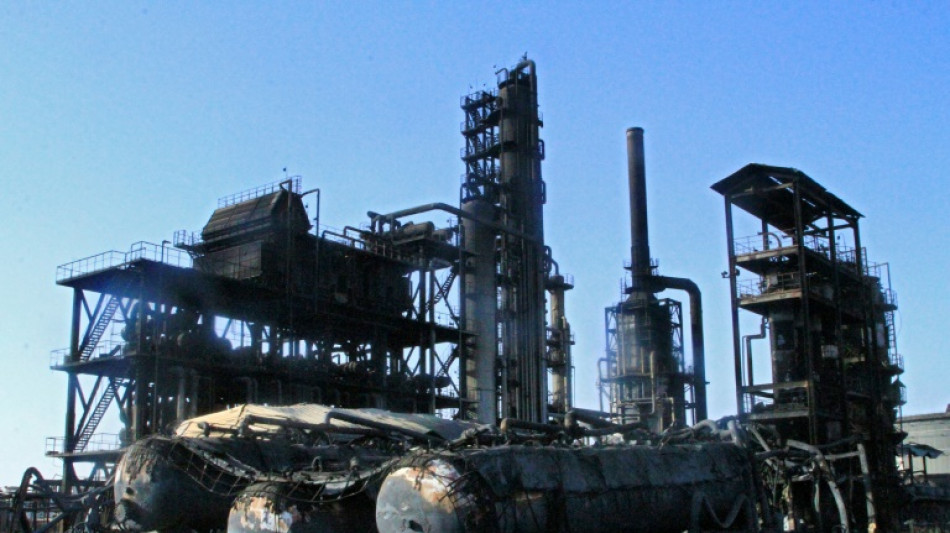
-
 Morocco volunteers on Sahara clean-up mission
Morocco volunteers on Sahara clean-up mission
-
Latin America fondly farewells its first pontiff

-
 'I wanted it to work': Ukrainians disappointed by Easter truce
'I wanted it to work': Ukrainians disappointed by Easter truce
-
Harvard sues Trump over US federal funding cuts

-
 'One isn't born a saint': School nuns remember Pope Francis as a boy
'One isn't born a saint': School nuns remember Pope Francis as a boy
-
Battling Forest see off Spurs to boost Champions League hopes

-
 'I don't miss tennis' says Nadal
'I don't miss tennis' says Nadal
-
Biles 'not so sure' about competing at Los Angeles Olympics

-
 Gang-ravaged Haiti nearing 'point of no return', UN warns
Gang-ravaged Haiti nearing 'point of no return', UN warns
-
US assets slump again as Trump sharpens attack on Fed chief

-
 Forest see off Spurs to boost Champions League hopes
Forest see off Spurs to boost Champions League hopes
-
Trump says Pope Francis 'loved the world,' will attend funeral

-
 Oscar voters required to view all films before casting ballots
Oscar voters required to view all films before casting ballots
-
Bucks' Lillard upgraded to 'questionable' for game 2 v Pacers

-
 Duplantis and Biles win Laureus World Sports Awards
Duplantis and Biles win Laureus World Sports Awards
-
US urges curb of Google's search dominance as AI looms

-
 The Pope with 'two left feet' who loved the 'beautiful game'
The Pope with 'two left feet' who loved the 'beautiful game'
-
With Pope Francis death, Trump loses top moral critic

-
 Mourning Americans contrast Trump approach to late Pope Francis
Mourning Americans contrast Trump approach to late Pope Francis
-
Leeds and Burnley promoted to Premier League

-
 Racist gunman jailed for life over US supermarket massacre
Racist gunman jailed for life over US supermarket massacre
-
Trump backs Pentagon chief despite new Signal chat scandal

-
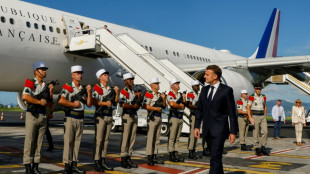 Macron vows to step up reconstruction in cyclone-hit Mayotte
Macron vows to step up reconstruction in cyclone-hit Mayotte
-
Gill, Sudharsan help toppers Gujarat boss Kolkata in IPL

-
 Messi, San Lorenzo bid farewell to football fan Pope Francis
Messi, San Lorenzo bid farewell to football fan Pope Francis
-
Leeds on brink of Premier League promotion after smashing Stoke

-
 In Lourdes, Catholic pilgrims mourn the 'pope of the poor'
In Lourdes, Catholic pilgrims mourn the 'pope of the poor'
-
Korir wins men's Boston Marathon, Lokedi upstages Obiri

-
 China's CATL launches new EV sodium battery
China's CATL launches new EV sodium battery
-
Korir wins Boston Marathon, Lokedi upstages Obiri

-
 Francis, a pope for the internet age
Francis, a pope for the internet age
-
Iraq's top Shiite cleric says Pope Francis sought peace
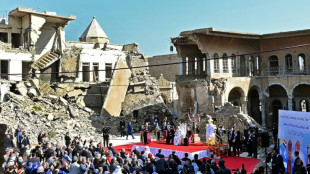
-
 Mourners flock to world's churches to grieve Pope Francis
Mourners flock to world's churches to grieve Pope Francis
-
Trump says Pope Francis 'loved the world'

-
 Sri Lanka recalls Pope Francis' compassion on Easter bombing anniversary
Sri Lanka recalls Pope Francis' compassion on Easter bombing anniversary
-
Pope Francis inspired IOC president Bach to create refugee team
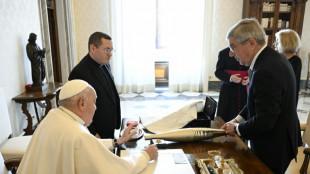
-
 Alexander-Arnold will be remembered for 'good things' at Liverpool: Van Dijk
Alexander-Arnold will be remembered for 'good things' at Liverpool: Van Dijk
-
US VP Vance meets Indian PM Modi for tough talks on trade

-
 Pentagon chief dismisses reports he shared military info with wife
Pentagon chief dismisses reports he shared military info with wife
-
15 potential successors to Pope Francis
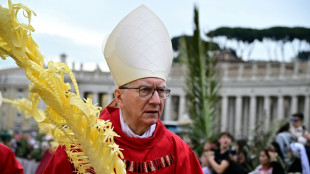
-
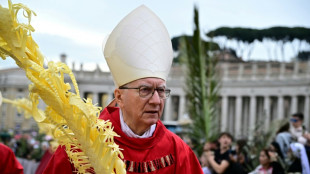 The papabili - 15 potential successors to Pope Francis
The papabili - 15 potential successors to Pope Francis
-
Zhao sets up all-China clash after beating 2024 world snooker finalist Jones

-
 Ostapenko stuns Sabalenka to win Stuttgart title
Ostapenko stuns Sabalenka to win Stuttgart title
-
Argentina mourns loss of papal son

-
 African leaders praise Pope Francis's 'legacy of compassion'
African leaders praise Pope Francis's 'legacy of compassion'
-
Mehidy's five wickets help Bangladesh fight back in first Zimbabwe Test

-
 'The voice of god': Filipinos wrestle with death of Pope Francis
'The voice of god': Filipinos wrestle with death of Pope Francis
-
Prayers, disbelief in East Timor after Pope Francis death

-
 Real Madrid hold minute's silence as La Liga mourns Pope Francis
Real Madrid hold minute's silence as La Liga mourns Pope Francis
-
World leaders pay tribute to Pope Francis, dead at 88


Battle for Khartoum wrecks key Sudan oil refinery
The once-pristine white oil tanks of Sudan's largest refinery have been blackened by nearly two years of devastating war, leaving the country heavily dependent on fuel imports it can ill afford.
The Chinese-built Al-Jaili refinery, some 70 kilometres (45 miles) north of Khartoum, was captured by the paramilitary Rapid Support Forces (RSF), just days after fighting with the regular army erupted in April 2023.
For months, artillery exchanges battered the facility, forcing a complete shutdown in July 2023.
The regular army finally recaptured the refinery in January as part of a wider offensive to retake greater Khartoum but operations remain at a standstill, with vast sections of the plant lying in ruins.
Towering storage tanks, which once gleamed under the sun, are now cloaked in soot and the ground is littered with twisted pipes and pools of leaked oil.
"Some units have been completely destroyed and are now out of service," the refinery's deputy director, Sirajuddin Muhammad, told AFP. "Other sections need to be entirely replaced."
Before the war, Al-Jaili processed up to 100,000 barrels per day of crude, meeting nearly half of Sudan's fuel needs.
"The refinery was crucial for Sudan, covering 50 percent of the country's petrol needs, 40 percent of its diesel and 50 percent of its cooking gas," economist Khalid el-Tigani told AFP.
"With its closure, Sudan has been forced to rely on imports to fill the gap, with fuel now being brought in by the private sector using foreign currency."
And hard currency is in desperately short supply in Sudan after the deepening conflict between Sudan's rival generals uprooted more than 12 million people, devastating the nation's economy.
The Sudanese pound now trades at around 2,400 to the dollar, compared to 600 before the war, leaving imported goods beyond the means of most people.
During the army's recapture of the refinery in January, what remained of it was gutted by a massive fire.
The RSF blamed the blaze on "barrel bombs" dropped by the air force.
The regular army accused the RSF of deliberately torching it in a "desperate attempt to destroy the country's infrastructure".
- '$1.3bn repair bill' -
An AFP team visited the refinery under military escort on Tuesday. Burnt out vehicles lined the roadside as the convoy passed through abandoned neighbourhoods.
As the refinery grew nearer, the blackened skeletons of storage tanks loomed in the distance and the acrid smell of burnt oil grew stronger.
The control rooms, where engineers once monitored operations, had been completely gutted.
Pools of water left over from the firefighting effort in January had yet to drain away.
Built in two phases, in 2000 and 2006, the plant cost $2.7 billion to build, with China taking the lead role.
Beijing still retains a 10 percent stake, while the Sudanese state controls the remaining 90 percent.
Refinery officials estimate it will cost at least $1.3 billion to get the refinery working again.
"Some parts must be manufactured in their country of origin, which determines the timeline of repairs," Muhammad said.
An engineer at the refinery, speaking on condition of anonymity because he was not authorised to speak to the media, said that even if Sudan secured the necessary financing, "it would still take at least three years to get this place running again".
The discovery of large domestic oil reserves in the 1970s and 1980s transformed the Sudanese economy.
But when South Sudan seceded in 2011, the fledgling nation took with it about three-quarters of the formerly united country's oil output.
South Sudan remains dependent on Sudanese pipelines to export its oil, paying transit fees to the rump country that are one of its few remaining sources of hard currency.
But the war has put that arrangement at risk.
In February last year, the pipeline used to export South Sudanese oil through Port Sudan on the country's Red Sea coast was knocked out by fighting between the army and the RSF.
Exports were halted for nearly a year, resuming only in January.
Y.Aukaiv--AMWN